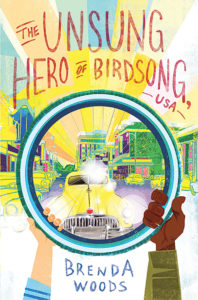The Unsung Hero of Birdsong, USA
Reviewed by Jerry Mizell Williams
December 1, 2019
 By Brenda Woods. Nancy Paulsen Books, 2019. 208 pages. $16.99/hardcover; $8.99/paperback (available January 2020); $9.99/eBook. Recommended for ages 10 and up.
By Brenda Woods. Nancy Paulsen Books, 2019. 208 pages. $16.99/hardcover; $8.99/paperback (available January 2020); $9.99/eBook. Recommended for ages 10 and up.
Birdsong, S.C., is the stage for a unique friendship between 12-year-old Gabriel Haberlin, who is White, and Meriwether Hunter, an unemployed Black man. In this coming-of-age short novel, readers view the world through the child’s eyes as he narrates a conventional story of adolescence circumscribed by school, a supportive family and friends, and occasional visits to nearby Charleston, S.C. Life is uneventful until a bicycle accident brings the characters together in a twist of fate that results in the two main characters turning sleepy Birdsong on its head for a while. Through divine intervention Meriwether saves Gabriel from being struck by a car, after which the child forms a bond with his rescuer and embarks on a “special destiny.” As a way to repay Meriwether’s act of kindness, Gabriel urges his father to employ Meriwether at his gas station. Conflict arises when another mechanic, Lucas, with suspected ties to the KKK and angered by the hire, begins to harass Meriwether and his family. What ensues is chapter after chapter of mounting tension, later resolved in part by Gabriel’s courage and tenacity.
The biblical significance of Gabriel’s age and name (as archangel and messenger of truth) will not be lost on readers. His spiritual nature empowers him to be sensitive and responsive to those around him, inviting them to share his untainted perspective of humanity. In many respects Gabriel is an ordinary child, who, guided by a moral compass, possesses a remarkably functional sense of what is right and wrong. Whereas Meriwether’s race is of concern to the adults in discriminatory Birdsong, Gabriel accepts and embraces his newfound friend without hesitation. The child’s increasing awareness of race is evident in the questions he asks his Oberlin College-educated parents about the inequality of White and Black schools and the presence of Whites-only signs. The sympathetic reply he receives jolts him to a higher level of perception: “Be a good thing for colored people not to have constant reminders of being unwelcome. Just imagine if those signs, instead of saying No Colored Allowed, said No Whites Allowed.” The image that Gabriel conjures of such a sign leads him to experience visceral discomfort. As Gabriel discovers more about the complexity of his environment—and in particular racial bigotry in Birdsong—he comes to understand that “being colored and being Negro are the exact same thing.” Not only is his father’s gas station one that serves coloreds, but it is also featured in The Negro Motorist Green Book, which listed places where Blacks were welcomed.
Meriwether shares his most guarded truth with Gabriel: that he fought in the Battle of the Bulge as part of the 761st Tank Battalion, an African American unit. In an act of self-preservation, Meriwether has never revealed his military service due to the hostile treatment and brutal death that returning WWII veterans encountered under Jim Crow. Furthermore, Meriwether is dispirited by the fact that the violent side of the segregated South translates into an early loss of innocence for colored children, as it now does for Gabriel. The latter feels himself growing as he stands on the precipice of adulthood, even envisioning justice in the form of a parade in Birdsong for Black veterans to reaffirm the dignity and justice they have been denied. Meriwether teaches Gabriel to see the world from the eyes of others, and united momentarily, they act as agents in transforming the small town. Gabriel learns unpleasant truths about his world; his choice to follow his conscience in the face of adversity is bolstered by a fundamental conviction that the truth is not expendable or negotiable. In this book, Brenda Woods is skillful in introducing her youthful audience to a realistic portrayal of segregation, lynching, and race in microcosmic Birdsong. I recommend this book to parents and school and meeting libraries. Woods merits praise for articulating the neglected contributions of the historic 761st—to whom the book is dedicated—and the veterans of color who helped the Allies achieve victory.



Comments on Friendsjournal.org may be used in the Forum of the print magazine and may be edited for length and clarity.